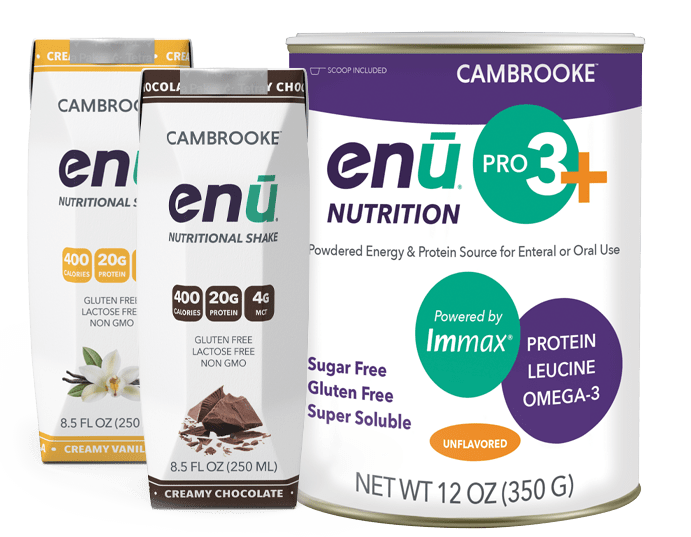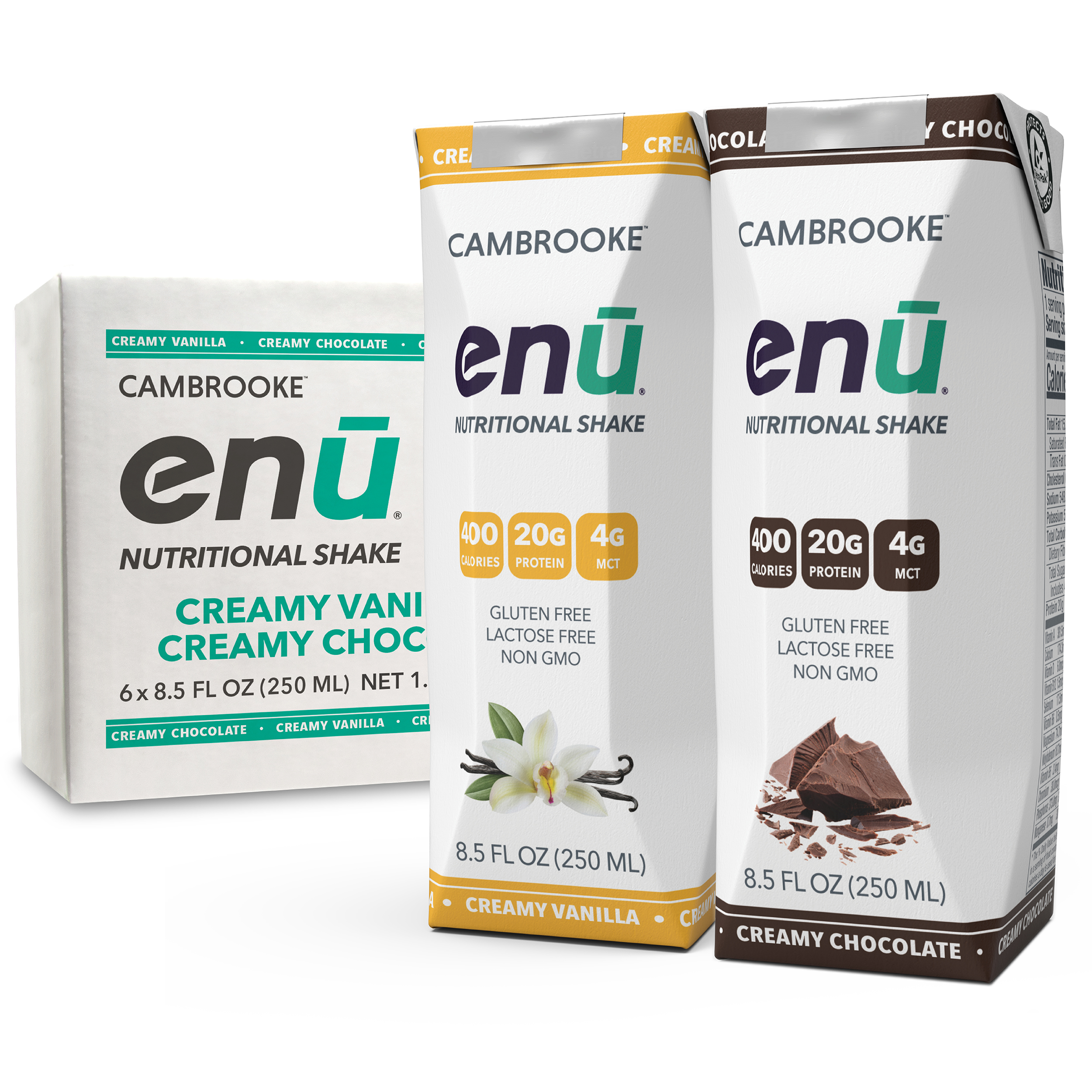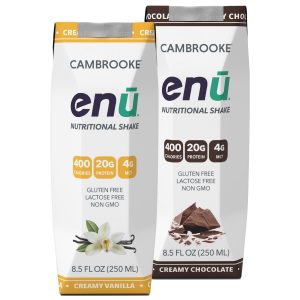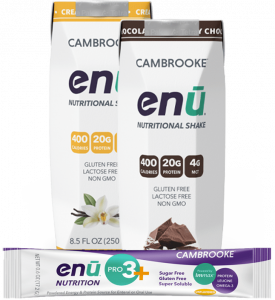Healthy Meal Replacement Shakes that Keep You Going
Shop Now
Customer Testimonial
When looking for a nutritious, high calorie meal replacement product... ENU is the clear winner.
For decades, replacing one or more of your daily meals with nutritional shakes has been a popular dieting option, but many of those shakes fail to provide the kind of well-rounded nutrition that a healthy meal would provide. Even in liquid form, a meal substitute should include a balanced mix of heart-healthy fats, complex carbohydrates, easily absorbed protein, and those key vitamins and minerals that keep your system running smoothly. Thanks to our focus on wholesome nutrition and real food ingredients, ENU provides exactly that: a healthy meal replacement shake for all your dietary needs. For more on the benefits of meal replacement drinks from ENU, keep reading or call (855) 266-6733 today.
Choosing the Best Meal Replacement Shake for You
Although the health and diet goals of our customers are as unique as the people themselves, there are a few generalizations that should always be taken into account when choosing the best meal replacement shake for you, starting with the nutritional profiles of diet shakes.
As mentioned above, many meal replacement drinks don’t provide adequate nutrition because they focus on one specific aspect of a product – how many calories it has, for instance, or the amount of sugar or carbs it contains. If you’re trying to lose weight, a low calorie count may be enough to attract you to a particular meal replacement shake, but keep in mind that your body needs more than just a certain number of calories; it needs the nutrients that keep your systems working properly and give you energy throughout the day.
Anything meant to serve as a meal substitute should, at the very least, have healthy sources of all three macronutrients – protein, carbs, and fats – and enough calories to actually stand in for a small meal. Just as a small lunch should be enough to hold you over until dinner, a meal replacement shake must be able to ward off hunger pangs and keep you from becoming ravenous by dinnertime; otherwise, you could wind up overcompensating and consuming too many calories at mealtimes or in snacks throughout the day, which would only undermine your weight loss goals.
In short, the best meal replacement shake for you is the one that leaves you feeling full, provides the nutrients your body requires, gives you lasting energy, and ultimately helps you achieve whatever health or fitness goal you’re aiming for.
Are Meal Replacement Shakes Safe?
Before using any diet shake or food replacement drink, it’s important to look into the safety of that product. In general, meal replacement shakes are perfectly safe to use; given the fact that they’re meant to be consumed, this fact probably won’t surprise you. However, there are a few potentially harmful factors to watch out for when selecting meal shakes.
While most meal replacement shakes are beneficial, some companies use shortcuts when making their products in an effort to boost profits or improve productivity, so check out the ingredients list before downing your next shake. Artificial sweeteners, for instance, are common in diet shakes because they’re cheap and free of calories, but there’s research suggesting that some artificial sweeteners can be harmful to your health. Similarly, additives like corn syrup and carrageenan often find their way into meal replacement shakes to improve taste or texture or boost calorie counts, despite the fact that they’re believed to carry risks of their own.
Even if a particular meal replacement shake doesn’t contain overtly harmful additives, check what types of carbs and fats are in the shake. Both saturated and trans fats are known to raise levels of LDL cholesterol (the bad kind) and can contribute to the development of cardiovascular disease in the long term, so look for these fats on the nutrition label. While less harmful than trans fats, simple carbs can also cause unhealthy effects on the body, such as a spike in blood sugar or the accumulation of visceral fat over time.
For the sake of your long-term well-being, try to select meal replacement shakes made with unsaturated fats, complex carbs, and plenty of protein, especially those that reject artificial sweeteners or corn syrup in favor of more natural ingredients. ENU shakes, for instance, use stevia as a sugar substitute, plus healthy sources of fats and carbs like coconut oil and quinoa.
Incorporating Meal Replacement Shakes into Your Diet
Though effective, meal replacement shakes are not magic potions that deliver change no matter how they’re used. Properly incorporating meal replacement drinks into your diet is key if you want to see results, so consider the following points when adding a diet shake to your routine.
How Much of My Calorie Intake Should Be from Shakes
Dieticians typically recommend that people get most of their calories and nutrients from traditional solid food sources, which means that you shouldn’t use a meal replacement shake several times a day (unless told otherwise by a healthcare professional). That said, if you choose a healthy meal replacement shake free from harmful additives, you should have no problem regularly substituting a shake for a small meal – about 300-400 calories’ worth, or 20-25% of your calories for the day.
Planning a Short-Term Shake Diet
For many people, meal replacement shakes are a short-term stopgap measure aimed at addressing a specific, temporary issue. You might, for instance, use meal shakes to lose weight while gaining muscle, then switch to an all-solid diet after reaching your weight goal; many people also use meal replacement shakes when undergoing cancer treatments, since they’re easy on the digestive system and don’t require chewing.
If you’re planning a short-term shake diet, you can probably get away with using shakes one or two times a day – or more, if a doctor suggests it. A temporary shift to a partially liquid diet carries few risks, if any, provided you stick with a nutritious product instead of one heavy with sugar or harmful additives. That said, it’s worth consulting with your primary care physician before making a meal replacement drink (or any other kind of supplement) part of your daily routine.
Planning a Long-Term Shake Diet
In the long term, meal replacement shakes should play a relatively minor role in your diet. Relying too heavily on prepackaged products instead of whole foods can be detrimental to your overall well-being, though it should be perfectly fine to use one shake every day or so. If you’re trying to maintain your current weight or battling a chronic illness, these shakes can offer a very useful way to add the calories or nutrients your body needs without forcing you to eat more food.
If you had cystic fibrosis, for instance, you might need to consume upwards of 3,000 calories a day – a tough goal to reach if your only option is to constantly prepare and force down solid meals. By simply adding a good meal replacement shake to your diet after a meal or between meals, you can boost your calorie and nutrient intake with minimal effort and bring yourself hundreds of calories closer to your daily goal.
Create an Effective + Healthy Diet Plan with ENU Meal Replacement Shakes
How you integrate a meal replacement shake into your diet plan will largely depend on your personal goals – for instance, whether you want to change your weight or circumvent your lack of appetite. Generally speaking, any shake being used as a meal substitute is probably not meant to help with weight gain, since the best way to put on pounds is to use your shake as a meal supplement, not a low-calorie replacement for a full meal.
Count Your Calories
If you’re looking to create an effective and healthy diet plan using ENU meal replacement shakes, start by setting some hard calorie goals. Most experts recommend losing no more than a pound or so a week; one pound of body fat is worth about 3,500 calories, so you’ll want to maintain a deficit of about 500 calories per day to lose a pound in seven days.
Of course, simply cutting out a quarter of your calories is easier said than done, which is where the meal replacement shake comes in. A diet shake that offers several hundred calories and contains significant portions of protein and healthy fats can be a powerful tool for cutting calories because both types of nutrients contribute to feelings of satiation; in other words, they help keep you from feeling hungry, even if you’ve only had a small meal replacement drink.
The Importance of Protein
However, calories and body fat aren’t the only factors you should keep in mind when crafting your new diet plan. Muscle mass plays a huge role in not only losing weight but also keeping that weight off for good, largely due to the fact that muscle tissue uses more calories at rest than other types. Put simply, the more muscle you have, the more calories you’ll burn, even when you’re just sitting on the couch.
To build this new muscle tissue, your body will need plenty of protein, which supplies essential amino acids. These amino acids both serve as the building blocks of new cells and boost the production of muscle tissue, so by using a meal replacement shake that has plenty of protein, you’ll be ensuring that your system has all the resources it needs to create new muscles for more effective long-term weight loss.

How Long After Eating Do You Start to Gain Weight?
Gaining weight at the right pace is important. Otherwise, you won’t see the results you want. So, how long after eating should you start...

When Does Your Body Use Protein for Energy?
You’ve probably heard that protein is an important facet of your diet. But do you know how important it really is? Learning how your body...

Foods to Avoid While on Chemo
When battling cancer, it is crucial to maintain a healthy diet. That means eliminating certain foods from your pantry and fridge. But...

Will Taking Protein Help You Lose Weight?
If you’re having trouble losing weight, you may not be supporting your nutrition properly. During weight loss, it’s important to still get...


